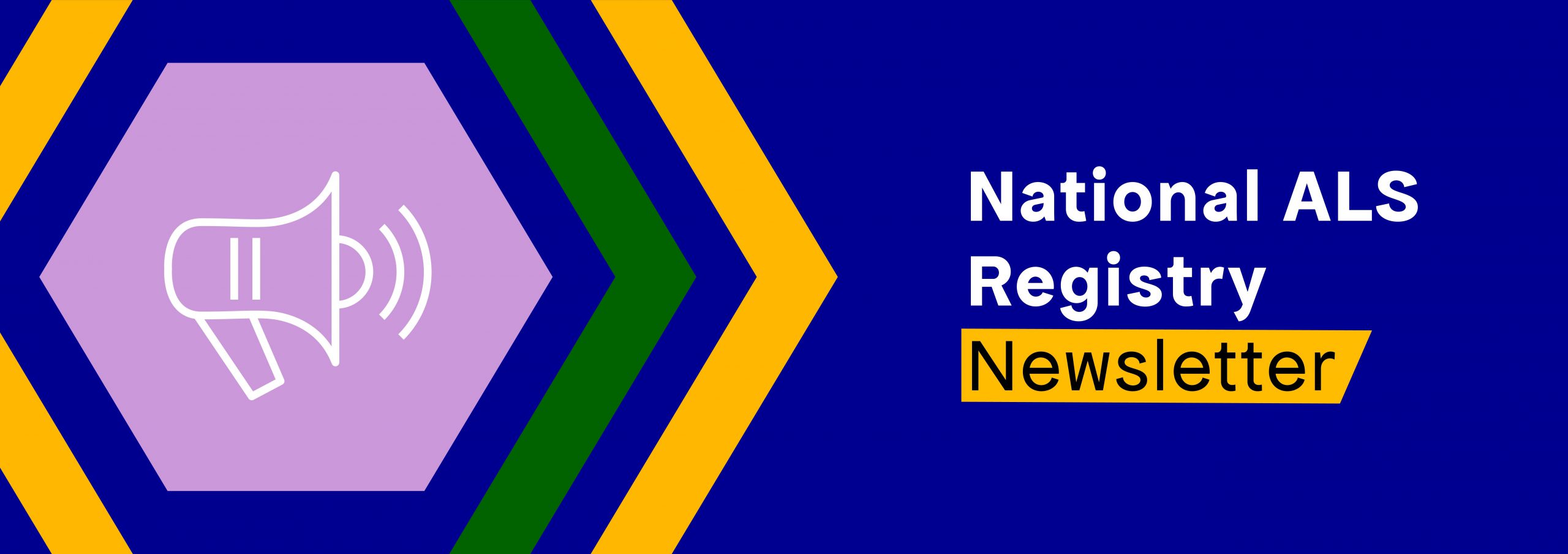The National ALS Registry Newsletter- Winter 2022
Sign Up for Our Newsletter
Want to learn more about the National ALS Registry? Sign up to stay up-to-date with the Registry
Joining the National ALS Registry offers the chance to participate in research and Be Counted.
|
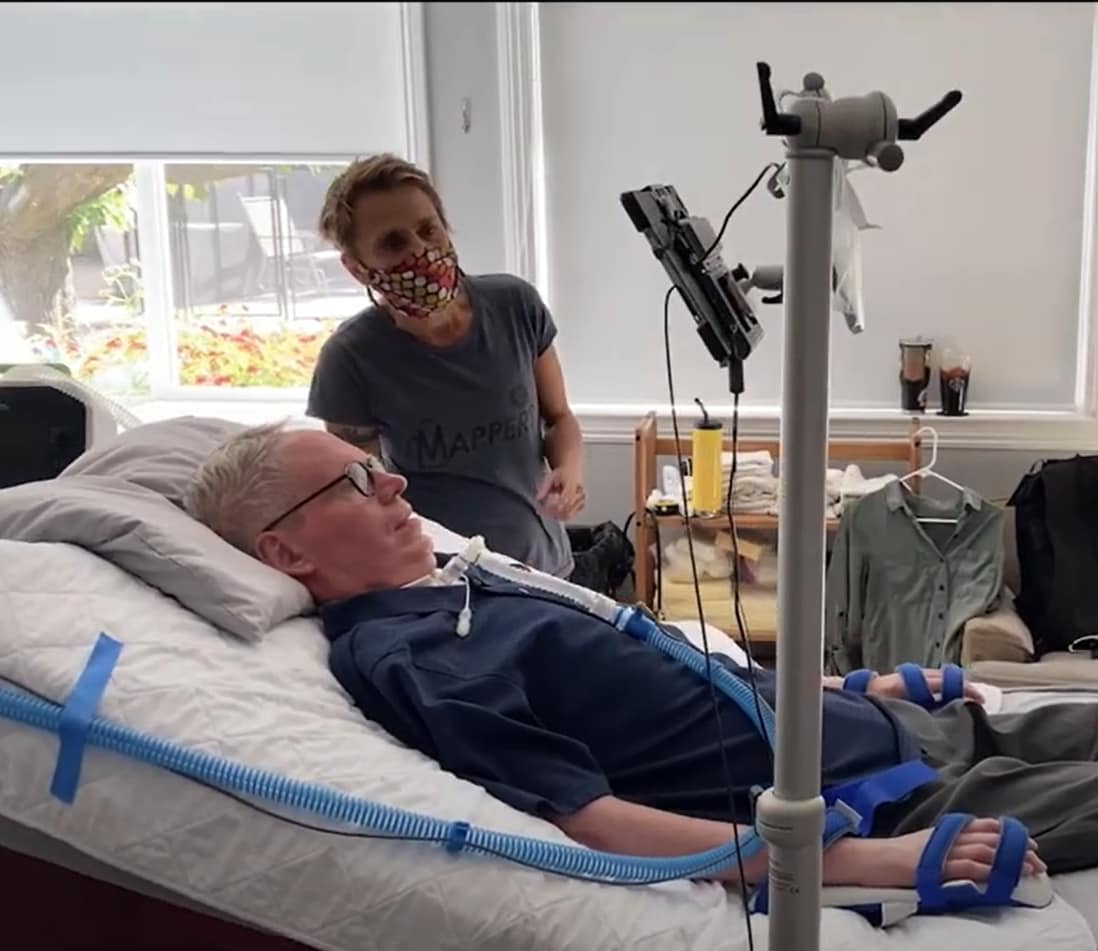
In this newsletter edition, the National ALS Registry recognizes a truly inspirational individual, Pat Dolan, who leveraged his almost 30-year career in Geographic Information Systems (GIS) to help ALS advocates and researchers by creating maps and apps for ALS.
Introduction
Pat grew up in Greeley, CO, and graduated from the University of Colorado with a BA in Environmental Conservation. Since 1992, Pat has worked in the GIS utility industry, and since 2002 with Esri, developers of the ArcGIS mapping software.
At Esri, Pat used GIS to model utility networks and help local utilities respond to natural disasters. Pat considers working with CAL FIRE (California Department of Forestry and Fire Protection) to map damage assessments during the 2007 Malibu fires as one of his most memorable career projects. Other career highlights include being a guest speaker for the Directors Guild of America’s “A Night of Total Destruction,” consulting on the 2014 Godzilla movie, and working with his Esri colleagues.
Pat’s ALS journey started in 2014 when he noticed muscle twitching and cramps during exercise. It wasn’t until 2016, after he began tripping during his morning runs, that his doctor identified muscle atrophy in his left calf, followed by an ALS diagnosis on July 21 of that same year. Today, Pat can no longer move, talk, eat, or breathe on his own. However, with the assistance of his eye gazing device, Pat continues to support the ALS community with his expertise in GIS.
Applying GIS to ALS
During his own quarterly visits to an ALS clinic, Pat learned about the lengths and difficulties many PALS (persons with ALS) face when traveling to their clinics. Through this experience, Pat saw the perfect opportunity to leverage his background in GIS to help the ALS community by understanding access to care and identifying underserved communities. Pat’s efforts resulted in his breakthrough creation of the ALS Clinic Locator and Survey, a resource that visually helps the ALS community locate nearby ALS clinics and allows PALS to share their clinic experiences to improve care at those facilities. A centralized source for all U.S. clinic locations didn’t exist when Pat was diagnosed, so Pat built an ALS clinic database. Pat updated this database every 3 months to keep the information current, an endeavor that took roughly 10,000 eye clicks to accomplish.
All of Pat’s GIS work culminated with the release of the ALS Geospatial Hub this past May. This hub is a centralized location for any advocate and researcher to access the maps and analysis to support their work. The hub’s mission is to bring geographic information together and make it available to all to help advocates and researchers discover patterns that can improve care, accelerate research, and amp up advocacy for the ALS community.
Pat is currently working on projects to release a new ALS clinic survey, a global ALS clinic locator, and a map of equal access to ALS clinical trials in the United States. Pat advocates GIS use as a perfect technology to solve not only ALS health care inequalities, but also for many of today’s other health care inequalities . Access to health care for ALS patients can drastically affect disease progression and quality of life. GIS can identify health care deserts and underserved communities and help determine where to locate new clinics and services to best serve the most patients.
Final Thoughts
Pat believes that to ensure health care equity, we need mandatory reporting of all ALS diagnoses. Knowing exactly how many people are living with ALS will let us allocate resources effectively, find correlations (and ultimately causation), and provide CDC researchers with information to track and predict the growth of ALS in the United States.
When asked about how his own ALS experience could help others, he said:
“The key to thriving with ALS is having a quality care team and generous family and friend donors who support that team. I’m blessed to have an amazing care team and wife who provides 24/7 care, which includes clearing my airway, hygiene care, moving my joints, and providing me the nutrition and medication that keeps me healthy and comfortable throughout the day. They are the heart and soul behind my work.”
Pat would also like to extend a special thanks to his Esri colleagues “Amanda Stanko, Earl Sarow, and Corey Kalishy who share their time and talents to developing the ALS Geospatial Hub. Also, Danielle Boyce, Clare Durrett, Maureen Clark, and Michelle Lorenz who have been my greatest advocates, which has kept me motivated each day to map with purpose and focus. I am truly blessed to have so many people supporting my work.”
Links:
ALS Association Clinic Locator
If you would like to nominate someone to be highlighted in the newsletter, please email als@cdc.gov
2021 National ALS Registry Annual Meeting Update
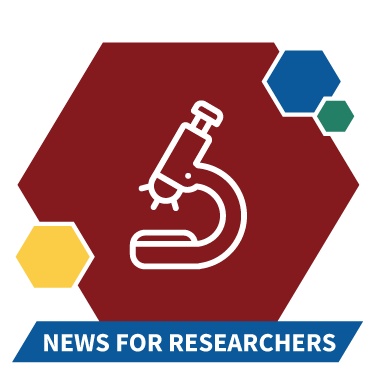
The National ALS Registry has held its Annual Meeting each year since 2011. This meeting has been an important way for neurologists, researchers, advocacy groups, and especially patients and caregivers, to provide guidance and direction for the Registry’s initiatives.
While COVID-19 continues to be a national concern, ATSDR held the National ALS Registry Annual Meeting on August 29-30, 2022 virtually as part of the agency’s commitment to protecting the health and safety of attendees.
This year’s annual meeting was open to the public both days and was moderated by ALS Patient Advocate Danielle Boyce. During the meeting, the Registry’s many research partners provided updates, three PALS spoke during a Patient Perspective Panel, and the public participated in an open discussion forum. The 2022 meeting was an immense success, with over 100 attendees each day who shared their positive feedback.
The meeting agenda and summary report can be found at the Registry’s website: Meetings Page
National ALS Registry Website Spotlight: New Registry Dashboard
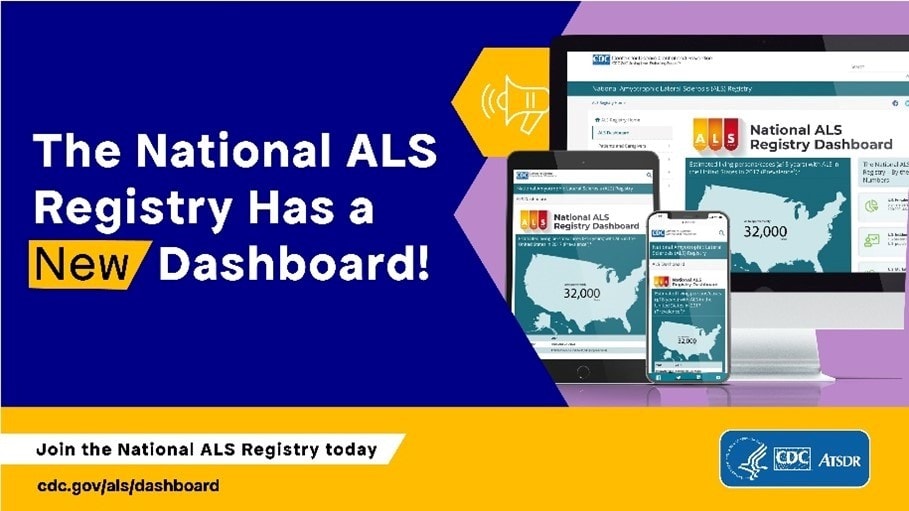
The Registry continuously strives to modernize and make it easier for the public to use its data. The Registry is proud to highlight the creation of a new dashboard to improve visitor’s website experience. The ALS Registry dashboard displays the latest epidemiological findings on ALS, the number of completed risk factor surveys, funded research and trials actively recruiting, and Biorepository data. Additionally, the dashboard provides shortcuts to the website’s different sections, such as publications, clinical trials, and annual reports.
Follow the link to view the new ALS Registry Dashboard
Events Attended by the Registry
| On September 24, the National ALS Registry participated in the annual ALS Association Georgia Chapter’s Walk to Defeat ALS, which is its largest fundraising and community event. The Registry is dedicated to continued collaboration with partner organizations to further ALS research. Pictured below are two National ALS Registry team members—Reshma Punjani, who staffed the Registry booth during the entire event, and Laurie Wagner, who represented the Registry in the Walk itself. |
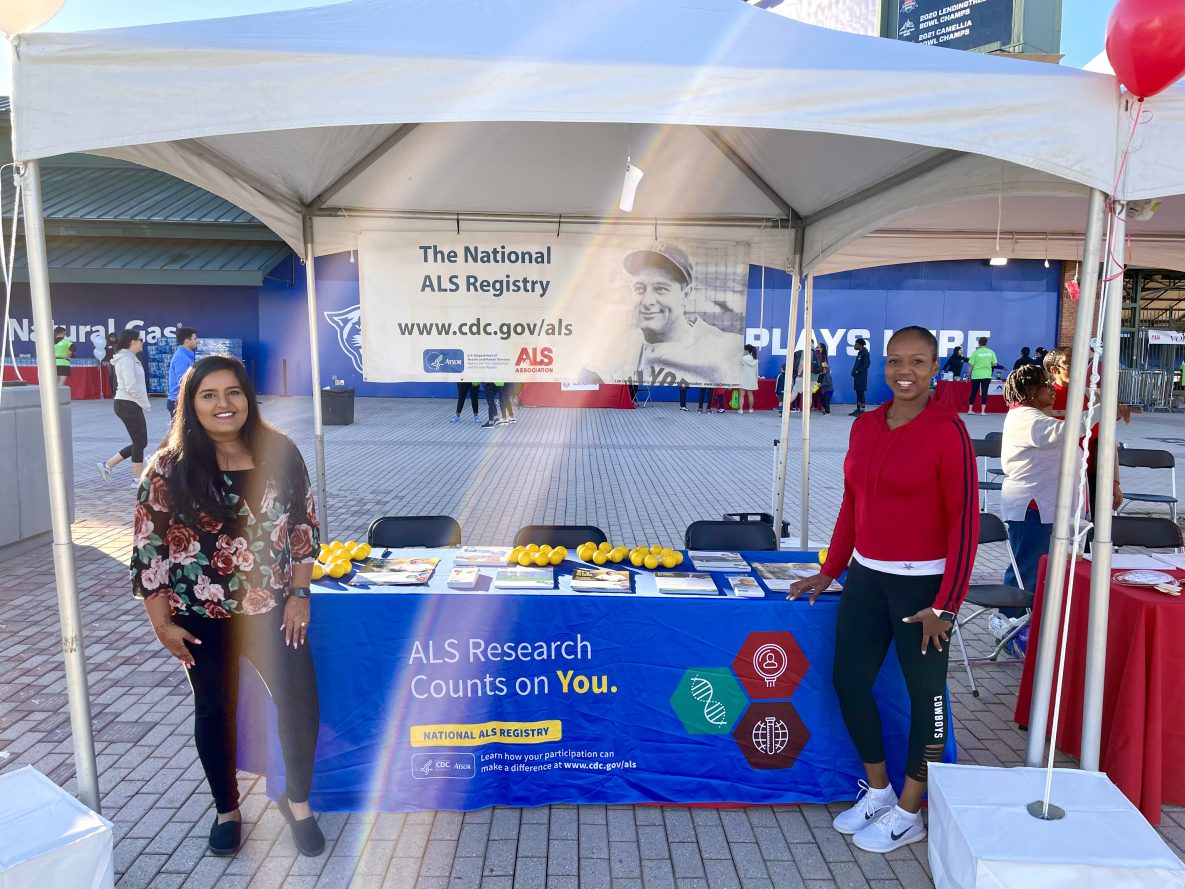
2022 ALS Registry Research Update
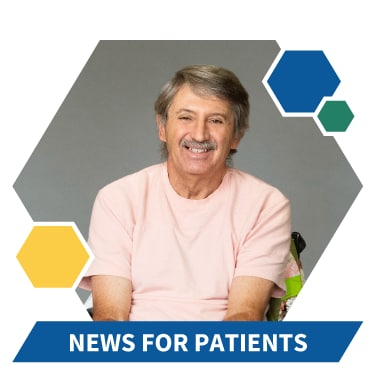
Research is critical to helping scientists and people living with ALS better understand the disease. The overarching goal of the research is to examine potential risk factors for developing ALS. One of the National ALS Registry’s basic functions is to provide data to further fund and increase ALS research.
This year, 2022, has been remarkable in expanding ALS research projects. To date, the Registry has been involved in over 10 new publications of ALS research, either through use of Registry data or participation of Registry staff. Examples include new methodologies for ALS data gathering to new technologies that potentially could identify and diagnose ALS. Additionally, through ATSDR’s research grant funding mechanism, the Registry has funded three new ALS research projects:
1. The association between military exposures and ALS in veterans
2. Machine learning and artificial intelligence to improve risk factor identification
3. The association between ALS disease progression and patient microbiome and immune system
Finally, the Registry’s Clinical Trial Notification system is helping twelve new clinical trials recruit study participants.
The National ALS Registry is steadfast in its commitment to push ALS Research along and continues to count on researchers and Registry members to participate.
You can learn more about the new research in 2022 involving the Registry at the following links:
• Published research papers
• External Research funded by the National ALS Registry
• Active ALS Research Notification for Clinical Trials and Studies

We want to hear from you
Have any questions or feedback on our newsletter?
We invite you to reach out to us.
als@cdc.gov
